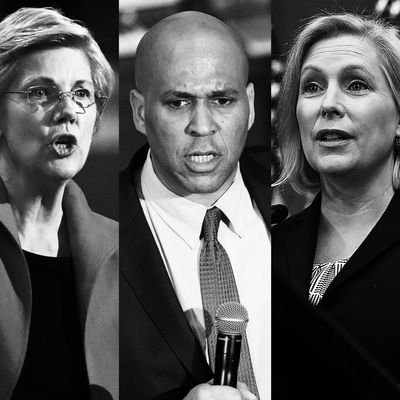
Who, if anyone, among potential 2020 Democratic candidates, strikes fear in the hearts of the president of the United States and his advisers, allies, and flunkies? Politico’s Annie Karni digs some intel out of the White House, and the view from Trumpworld is interesting if not terribly logical.
It seems Trump himself dismisses Bernie Sanders out of hand due to his age. But at the same time his people view Joe Biden as the biggest threat of all the donkeys:
One former White House official outlined a theory of the case that has gained some traction: Trump’s policies will continue to be popular all the way through his reelection campaign, but his approval rating will never crack 45 percent — creating an opening for Biden, or someone like him, to recapture the loyalty of white Rust Belt Democrats who helped elect Trump in 2016.
I have no way of knowing whether the president or his advisers are aware that Biden is only a year younger than Sanders, or that Bernie also has some potential appeal for white Rust Belt Democrats, as evidenced by the 2016 Democratic primaries. (There’s also Sherrod Brown of Ohio, assuming he wins reelection this year, and former Maryland governor Martin O’Malley, who appeals to a lot of the same kind of white ethnic Catholic voters as Biden.) For that matter, a vote’s a vote, and potential gains other Democrats might make could beat Trump just as definitively as an uptick among white working-class voters.
Recent data from SurveyMonkey shows that Trump is losing support among women — particularly non-college-educated white women and minority women generally — pretty steadily. A female candidate like Elizabeth Warren (who has a sharp populist message especially tailored to white working-class voters), Kirsten Gillibrand, or Kamala Harris might exploit that Trump vulnerability. Another key factor in Hillary Clinton’s 2016 loss was poor turnout among African-Americans. Black candidates Harris and Cory Booker — or possibly even Oprah Winfrey — could make a big difference among that demographic group.
But the beginning of wisdom for Team Trump is the realization that even in victory, he did not just lose the popular vote to Hillary Clinton, but did about as well as near-landslide loser John McCain in 2008 (Trump won 46.1 percent of the popular vote as compared to 45.7 percent for McCain). It’s not clear there could ever be an actual majority coalition for Trump, which means he has to trust that the Fates will bring him another poor candidate. Positive external developments like steady economic growth do not appear to be making him more popular, which basically means he may not pocket any incumbency advantage.
If, as appears increasingly likely, Republicans lose effective control of the U.S. House (with or without a formal loss of control; an extremely narrow margin could make getting anything done very difficult), Trump could spend three years twiddling his thumbs, before facing the voters with few additional accomplishments. And while Trump is right that a candidate older than he is might help with his own age and energy vulnerabilities, most potential rivals won’t be late-septuagenarians or exercise-averse junk-food fans.
It’s even possible than in suggesting he fears Biden, Trump is playing Brer Rabbit, hoping he gets thrown into the political briar patch of facing a septuagenarian who would become an octogenarian within two years of taking office, thus making his own self the Youth Candidate. More likely, Trump is simply overconfident as he looks ahead to reelection. There is simply not enough time for Trump’s friends to turn any of the potential Democratic candidates into the kind of generational punching bag that decades of demonization (from both conservative ideological and mainstream journalists) made of Hillary Clinton. And if the experience of the last year means anything, additional exposure to the 45th president is not going to make him a popular, unifying figure or even a consistent source of anything other than anxiety to his friends.






























